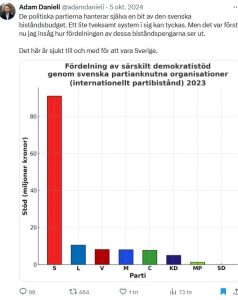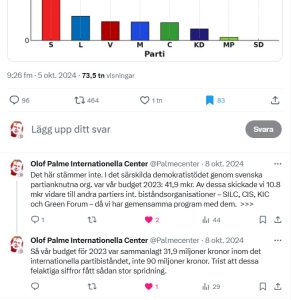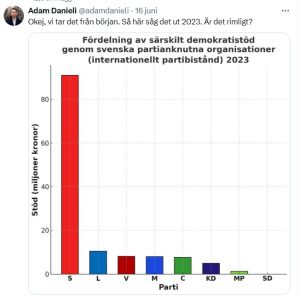
Nyhetsbrev
Prenumerera gratis på våra nyhetsbrev och inbjudningar till seminarier.

Prenumerera gratis på våra nyhetsbrev och inbjudningar till seminarier.


Nej, Olof Palmes Internationella Center är en egen civilsamhällesorganisation med decenniers erfarenhet av att bedriva utvecklingssamarbete och biståndsprojekt på många platser runt om i världen.
Palmecentret har 26 medlemsorganisationer som representerar en stor och viktig del av det svenska civilsamhället, arbetarrörelsen.
Arbetarrörelsen har nyckelkompetenser som är centrala för främjandet av demokrati, mänskliga rättigheter och det civila samhället internationellt. Inte minst inom gräsrotsorganisering, folkbildning och facklig organisering.
Vi har stora globala nätverk inom fackföreningsrörelsen, folkbildningen och med sociala rörelser som finns på plats även i de mest repressiva miljöerna runt om i världen. Vi har också arbetat upp unika nätverk och samarbetsparter inom ”vår del” av det globala civilsamhället.
20 av våra medlemsorganisationer är inte partipolitiska. (Fack, folkbildning och andra folkrörelser.) Dessa representerar med flera miljoner medlemmar en stor del av civilsamhället. I och med Sidas nya beslut utestängs dessa från det kommande samarbetet. Det kommer få konsekvenser både för Sidas civilsamhällesstöd – och för våra över 100 lokala samarbetspartners inom civilsamhället.
Utöver detta har Palmecentret 6 partipolitiska medlemsorganisationer. (De är också folkrörelser, men inom civilsamhället kategoriseras politiska partier i en särskild kategori.) Vi har ett särskilt uppdrag att bedriva ett internationellt partibistånd. Det vill säga att främja utvecklingen av demokrati genom att stötta politiska partier i deras demokratiska utveckling då partier spelar en nyckelroll för ökad demokratisering.
De ekonomiska medlen vi har för civilsamhällesstöd och för partistöd hålls strikt isär. De redovisas och rapporteras utifrån två helt olika uppdrag och strukturer.
Bakgrund: Ibland brukar man beskriva organisationer som civilsamhällesorganisationer (CSO) och partinära organisationer (PAO). Vad regeringen nu säger är att man inte kan vara både ock i civilsamhällesstödet.
Det här är helt nytt. Tvärtom har flera av de svenska partinära organisationer haft uppdrag inom civilsamhällesstrategin i olika omgångar. I den senaste ansökan var det Palmecentret och liberala Silc som hade för avsikt att ha det.
Och det finns ingen motsättning mellan att ha både uppdragen – tvärtom främjas ofta det lokala civilsamhället av att nätverk och kompetens finns inom både civilsamhälle, fack och politik.
Många folkrörelser är eller har varit politiska. Om man ser på vårt eget lands historia har de politiska folkrörelserna spelat en mycket stor roll för vårt lands utveckling. Civilsamhället är brokigt och skiftande, och kan inte så enkelt kategoriseras. Precis som det ska vara. Så det ovanstående påståendet ger nog mer ett uttryck för en moderat världssyn. Högern saknar själva folkrörelserötter.
Palmecentret är en civilsamhällesorganisation som bedriver ett stort antal biståndsprojekt runt om i världen. Redovisnings- och återrapporteringskraven är rigorösa. Intresserade får naturligtvis ta del av våra verksamhetsberättelser, årsredovisningar och återrapportering till Sida.
Här finner man den senaste verksamhetsberättelsen: Verksamhetsberättelse 2024.
Här kan man söka i Sidas öppna databas: OpenAid.
Palmecentret har ansökt om medel för våra biståndsprojekt utifrån ett mycket krävande ansökningsförfarande och utifrån exakt samma kriterier som alla andra civilsamhälles-organisationer. Liberalernas Silc har också sökt från civilsamhällesstrategin.
Det har fram tills nu inte funnits några särregler. Det har till exempel inte funnits någon regel som uteslutit den moderata Jarl Hjalmarsson-stiftelsen att också ansöka uppdrag inom ramen civilsamhällesstrategin. Att de inte gjort det är en helt annan fråga.
Den enda särbehandling som förekommer i det här fallet är biståndsminister Dousas nu skräddarsydda regeländring för att främst komma åt Palmecentret – utifrån den strategi som utarbetats av den nyliberala tankesmedjan Timbro, för att slå mot arbetarrörelsen.
Vad det sedan gäller Palmecentrets senaste ansökan sa till exempel Torbjörn Pettersson (chef för den avdelning på Sida som hanterar de båda stöden) i Global Bar Magasin den 18 juni:
– Jag bedömde Palmecentret som en väl kvalificerad organisation med en bra ansökan till CSO strategin och beslöt om fortsatt beredning för att fastställa avtalsbeloppets storlek.
Ett beslut som sedan stoppades abrupt av Sidas generaldirektör den 12 juni.
Det här påståendet beror på vilka andra organisationer man jämför Palmecentret med.
Om vi ser inom ramen för det särskilda uppdraget att stötta civilsamhället internationellt, CSO-strategin, har vi varit vad man skulle kunna kalla en medelstor aktör/uppdragstagare – jämfört med mycket större större organisationer som Act Svenska kyrkan, Diakonia, etc.
Om man sedan ser till partistödsuppdraget, PAO-strategin, stämmer det att vi får mest bland de organisationer som verkar inom denna strategi. Det beror inte minst på att stödet är fördelat efter mandat i Riksdagen och större politiska partier (som sedan ger uppdrag till en partinära organisation att genomföra uppdraget) därmed får en större del av budgeten.
Det finns en särskild desinformation som just nu sprids kring just detta och som får stor spridning:
Den 5 oktober 2024 hade Adam Danieli, programansvarig och ansvarig för rättsstatsfrågor på Timbro (och upphovsman till just Kommandohöjderna – som nämns ovan), en konversation på X med sin tidigare Timbro-kollega Benjamin Dousa som berörde just Palmecentrets PAO-verksamhet. I den sprids ett gravt missvisande diagram av Adam Danieli som sen var utgångspunkt i konversationen:


Källa: https://x.com/BenjaminDousa/status/1842487287923249360
Palmecentret påtalade detta direkt till Adam Danieli och Timbro (via telefonsamtal, samt på Facebook och på X där diagrammet delades) att statistiken var helt felaktig.

Källa: https://x.com/adamdanieli/status/1842466387748442329
Trots detta låg uppgifterna kvar ute, och den 16 juni i år återpublicerade Adam Danieli diagrammet. Inläggen har sammanlagts sett av hundratusentals personer.

Källa: https://x.com/adamdanieli/status/1934677129708327207
Tillbaka till nyhetsuppdateringen om Sidas nya beslut.
Frågor & svar: CSO-ansökanFrågor och svar.
A: Först och främst, har vi svårt att förstå vad Sidas generaldirektör nu menar.
I strategin står att ”Stöd inom ramen för denna strategi får inte ges till politiska partier i ODA-länder eller till deras associerade förbund.”
– Palmecentret är varken ett politiskt parti eller ett associerat förbund till ett politiskt parti i ODA-länder (biståndsländer.).
– Palmecentrets verksamhet inom ramen för CSO-strategin riktar sig inte heller till politiska partier i ODA-länder, utan till civilsamhällesorganisationer.
Vi är en svensk civilsamhällesorganisation med 26 medlemsorganisationer som representerar en stor och viktig del av civilsamhället – från folkbildning, fackföreningsrörelse till hyresgästföreningen, och så vidare.
Vi har i CSO-processen inte stött på någon som har delat biståndsminister Dousas tolkning av strategin. Vi har i processen godkänts i alla led av Sida. Nu svänger plötsligt Sidas generaldirektör i absolut sista sekund efter ett års ansökningsprocess och ändrar Sidas beslut. Det är otroligt märkligt. Vad har hänt?
A: Uppdraget att stötta civilsamhället internationellt är en viktig del av vår verksamhet.
Det kommer om det försvinner främst drabba våra hundratals partners runt om i världen. Demokratikämpar, fackföreningsledare, människorättsaktivister, kvinnor, unga och marginaliserade grupper och deras viktiga arbete för demokrati och mänskliga rättigheter. Beslutet är en katastrof för dem när de abrupt behöver avsluta sin verksamhet.
A: Vi är en civilsamhällesorganisation som samarbetar med 21 medlemsorganisationer som inte är partipolitiska i vårt uppdrag.
Dessa representerar med flera miljoner medlemmar – en betydande och viktig del av civilsamhället. Utöver detta har vi också ett särskilt uppdrag att bedriva ett internationellt partibistånd.
Arbetarrörelsen har nyckelkompetenser som är centrala för främjandet av demokrati, mänskliga rättigheter och det civila samhället internationellt. Inte minst inom gräsrotsorganisering, folkbildning och facklig organisering. Vi har stora globala nätverk inom fackföreningsrörelsen, folkbildningen och sociala rörelser som finns på plats även i de mest repressiva miljöerna runt om i världen. Om vi faller bort då faller en stor del av dessa verksamhetsområden och grupper också bort.
Vår verksamhet står också helt på egna meriter inom utvecklingssamarbetet där vår kompetens, erfarenheter och våra verktyg och nätverk alltid tidigare hållits högt av den ansvariga biståndsmyndigheten.
A: Ett negativt Sida-besked kommer naturligtvis få betydelse för Palmecentrets möjlighet att verka för demokrati, mänskliga rättigheter, jämlikhet och fred. CSO-uppdraget har varit en viktig och central del av vår verksamhet och för de hundratals partners vi har runt om i världen.
Vi vet att CSO idag står för cirka 40% av vår totala budget. Om det försvinner så drabbar det främst våra partners runt om i världen. Demokratikämpar, fackföreningsledare, människorättsaktivister, kvinnor, unga och marginaliserade grupper och deras viktiga arbete för demokrati och mänskliga rättigheter, och som nu tvingas avsluta sin verksamhet. Det handlar om vanliga människor som kämpar mot förtryck och för rätten att påverka sin framtid och sina livsvillkor. När stödet till deras arbete kapas kommer det också få betydelse för utvecklingen på de platser där vi är verksamma.